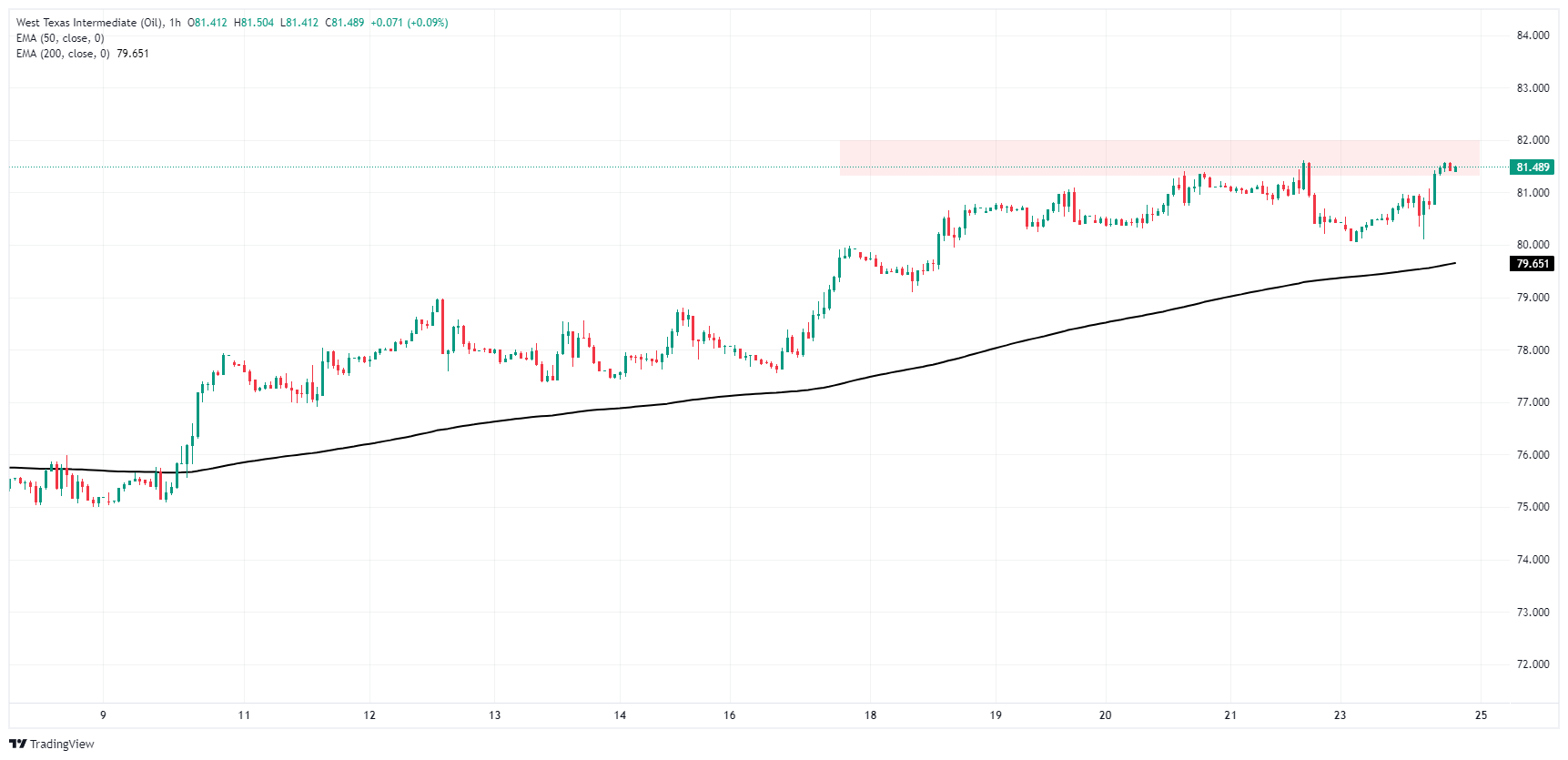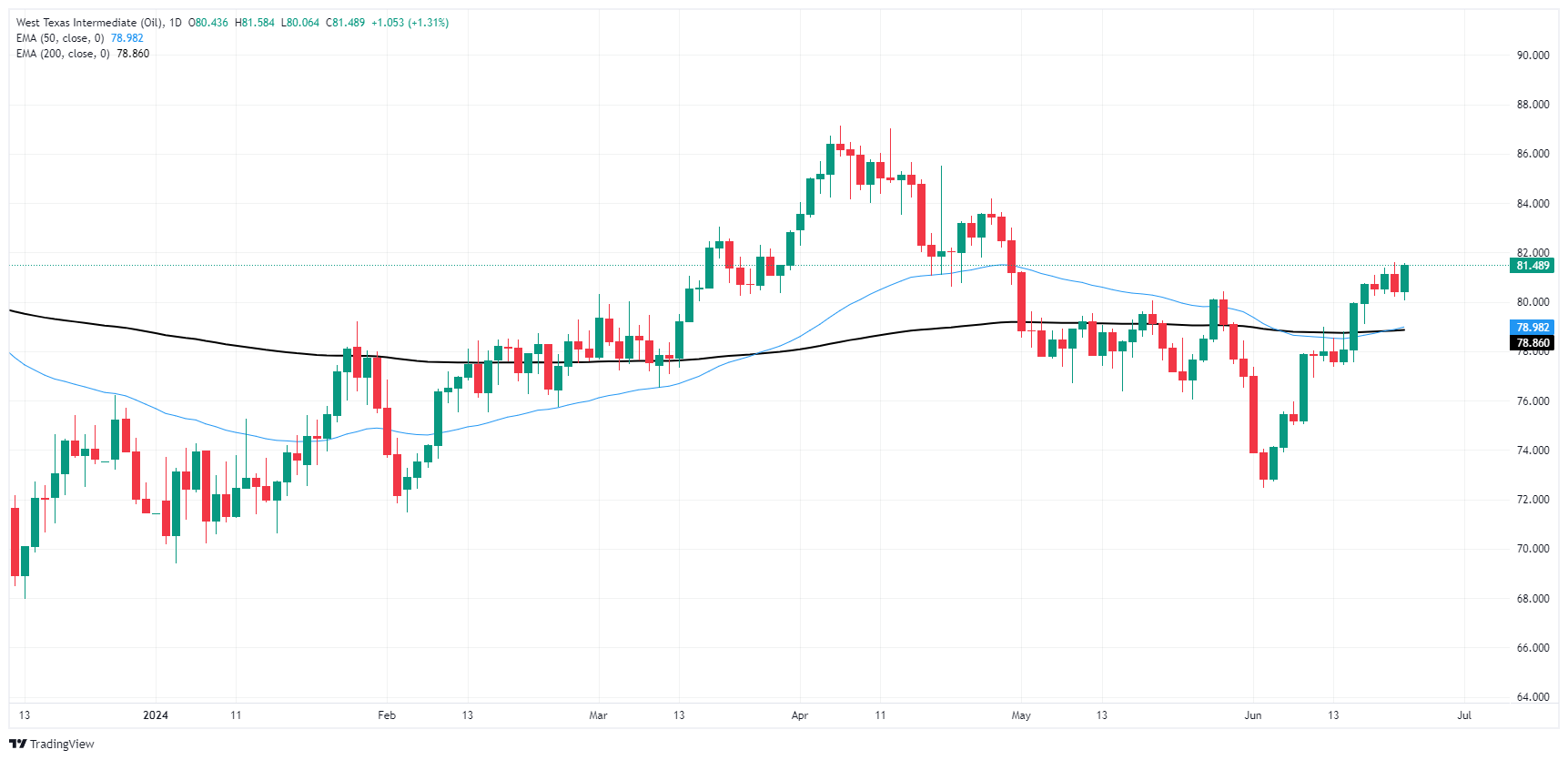- Phân tích
- Tin tức và các công cụ
- Tin tức thị trường
- Crude Oil grinds back into the top end on Monday, WTI clips into $81.50
Crude Oil grinds back into the top end on Monday, WTI clips into $81.50
- WTI rebounded after a near-term dip towards $80.00.
- Energy markets are churning as investors look for firmer signs of supply drawdown.
- Ongoing geopolitical turmoil keeps supply concerns front and center, bolstering prices.
West Texas Intermediate (WTI) US Crude Oil found a firm bid on Monday, rebounding to the $81.50 region after easing within reach of the $80.00 handle. Energy markets remain choppy as investors hope for a broad-market push higher on the possibility of rising demand in the future while trying to shrug off current supplies, which see an increasing overhang on current demand.
Leadership in Israel shrugged off the latest version of a proposed ceasefire between Israeli forces and Palestinian Hamas, keeping Crude Oil markets underpinned as investors continue to bake in the possibility of the ongoing Gaza conflict spilling over into neighboring countries.
Energy investors will be looking ahead to this week’s US Crude Oil stocks updates from the American Petroleum Institute (API) and the Energy Information Administration. Week-on-week counts went in different directions last week, with the API noting a drawdown while the EIA found a slight uptick in supply counts. Crude Oil speculators will be looking for a steeper draw on US Crude Oil supplies as economies head into the summer months, with barrel traders specifically looking for increased fuel demand for cooling and summer travel.
Economic Indicator
API Weekly Crude Oil Stock
API’s Weekly Statistical Bulletin (WSB) has reported total U.S. and regional data relating to refinery operations and the production of the four major petroleum products: motor gasoline, kerosene jet fuel, distillate (by sulfur content), and residual fuel oil. These products represent more than 85% of total petroleum industry.
Read more.Next release: Tue Jun 25, 2024 20:30
Frequency: Weekly
Consensus: -
Previous: 2.264M
Source: American Petroleum Institute
Economic Indicator
EIA Crude Oil Stocks Change
The EIA Crude Oil stockpiles report is a weekly measure of the change in the number of barrels in stock of crude oil and its derivates, and it's released by the Energy Information Administration. This report tends to generate large price volatility, as oil prices impact on worldwide economies, affecting the most, commodity related currencies such as the Canadian dollar. Despite it has a limited impact among currencies, this report tends to affect the price of oil itself, and, therefore, had a more notorious impact on WTI crude futures.
Read more.Next release: Wed Jun 26, 2024 14:30
Frequency: Weekly
Consensus: -
Previous: -2.547M
WTI technical outlook
Bullish intraday momentum has left US Crude Oil stranded in a growing supply zone above the $81.00 handle, with prices growing sluggish at $81.50 and could be poised for an exhaustion pullback to familiar levels. Daily candles are pinned into near-term bull country above the 200-day Exponential Moving Average (EMA) at $78.38, but a rapid rise from the last swing low into $72.45 could leave bullish momentum without a firm technical leg to stand on, and odds are leaning into a return to long-term median prices.
WTI hourly chart
WTI daily chart
WTI Oil FAQs
WTI Oil is a type of Crude Oil sold on international markets. The WTI stands for West Texas Intermediate, one of three major types including Brent and Dubai Crude. WTI is also referred to as “light” and “sweet” because of its relatively low gravity and sulfur content respectively. It is considered a high quality Oil that is easily refined. It is sourced in the United States and distributed via the Cushing hub, which is considered “The Pipeline Crossroads of the World”. It is a benchmark for the Oil market and WTI price is frequently quoted in the media.
Like all assets, supply and demand are the key drivers of WTI Oil price. As such, global growth can be a driver of increased demand and vice versa for weak global growth. Political instability, wars, and sanctions can disrupt supply and impact prices. The decisions of OPEC, a group of major Oil-producing countries, is another key driver of price. The value of the US Dollar influences the price of WTI Crude Oil, since Oil is predominantly traded in US Dollars, thus a weaker US Dollar can make Oil more affordable and vice versa.
The weekly Oil inventory reports published by the American Petroleum Institute (API) and the Energy Information Agency (EIA) impact the price of WTI Oil. Changes in inventories reflect fluctuating supply and demand. If the data shows a drop in inventories it can indicate increased demand, pushing up Oil price. Higher inventories can reflect increased supply, pushing down prices. API’s report is published every Tuesday and EIA’s the day after. Their results are usually similar, falling within 1% of each other 75% of the time. The EIA data is considered more reliable, since it is a government agency.
OPEC (Organization of the Petroleum Exporting Countries) is a group of 13 Oil-producing nations who collectively decide production quotas for member countries at twice-yearly meetings. Their decisions often impact WTI Oil prices. When OPEC decides to lower quotas, it can tighten supply, pushing up Oil prices. When OPEC increases production, it has the opposite effect. OPEC+ refers to an expanded group that includes ten extra non-OPEC members, the most notable of which is Russia.
© 2000-2026. Bản quyền Teletrade.
Trang web này được quản lý bởi Teletrade D.J. LLC 2351 LLC 2022 (Euro House, Richmond Hill Road, Kingstown, VC0100, St. Vincent and the Grenadines).
Thông tin trên trang web không phải là cơ sở để đưa ra quyết định đầu tư và chỉ được cung cấp cho mục đích làm quen.
Giao dịch trên thị trường tài chính (đặc biệt là giao dịch sử dụng các công cụ biên) mở ra những cơ hội lớn và tạo điều kiện cho các nhà đầu tư sẵn sàng mạo hiểm để thu lợi nhuận, tuy nhiên nó mang trong mình nguy cơ rủi ro khá cao. Chính vì vậy trước khi tiến hành giao dịch cần phải xem xét mọi mặt vấn đề chấp nhận tiến hành giao dịch cụ thể xét theo quan điểm của nguồn lực tài chính sẵn có và mức độ am hiểu thị trường tài chính.
Sử dụng thông tin: sử dụng toàn bộ hay riêng biệt các dữ liệu trên trang web của công ty TeleTrade như một nguồn cung cấp thông tin nhất định. Việc sử dụng tư liệu từ trang web cần kèm theo liên kết đến trang teletrade.vn. Việc tự động thu thập số liệu cũng như thông tin từ trang web TeleTrade đều không được phép.
Xin vui lòng liên hệ với pr@teletrade.global nếu có câu hỏi.















